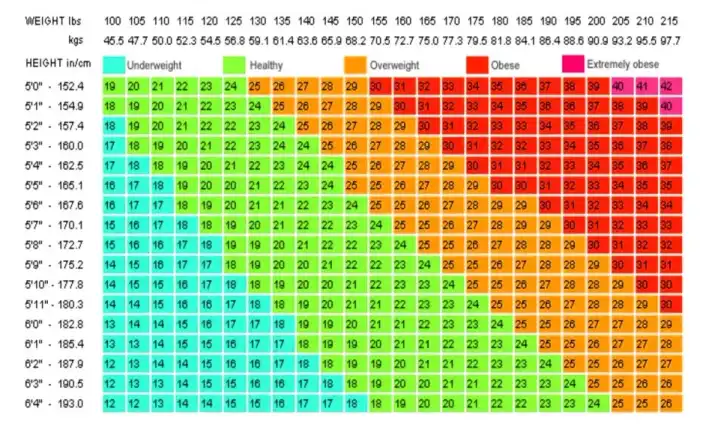Body Mass Index for men
Body Mass Index (BMI) is a measure of body fat based on your height and weight. You can either consult the BMI chart for men or use the BMI calculator provided below to determine your body mass index.
Body Mass Index calculator for men
Enter your weight, height, age, and gender using standard or metric units in the BMI calculator below:
What is a good BMI for men?
The guideline is between 18.5 and 24.9 for a healthy BMI for men. The World Health Organization (WHO) and the Centers for Disease Control and Prevention (CDC) have established the following categories for adults based on their Body Mass Index (BMI):
| BMI | Weight Status |
|---|---|
| Less than 16 | Severely underweight |
| 16 to 17 | Moderately underweight |
| 17 to 18.5 | Mildly underweight |
| 18.5 to 25 | Healthy weight |
| 25 to 30 | Overweight |
| 30 to 35 | Obese class I |
| 35 to 40 | Obese class II |
| Greater than 40 | Obese class III |
The BMI calculator result value is used to classify a person as severely underweight, moderately underweight, normal weight, overweight, obese class I, obese class || or obese class ||| based on certain ranges.
BMI chart men
Find below a general adult BMI chart male.

How to calculate BMI for men?
BMI, or Body Mass Index, is calculated using a simple formula that takes into account a person's height and weight. The formula is the same for both men and women:
BMI = weight (pounds) / height (inches)2 x 703
To calculate your BMI as a man, follow these steps:
- Weigh yourself in pounds.
- Measure your height in inches.
- Square your height.
- Divide your weight in pounds by your squared height in inches.
- Multiply the result by the conversion factor 703
The potential negative health effects of having a high BMI for men
Having a high BMI, or Body Mass Index, as a man can increase your risk for a number of negative health effects. BMI is a measure of body weight in relation to height, and a high BMI indicates that you may be carrying excess body fat. The negative health effects associated with a high BMI include:
- Cardiovascular disease: Men with a high BMI are at increased risk for heart disease and stroke, as excess body fat can lead to high blood pressure, high cholesterol, and other risk factors.
- Type 2 diabetes: Men with a high BMI are more likely to develop type 2 diabetes, which can lead to a range of complications including nerve damage, kidney damage, and vision problems.
- Joint problems: Carrying excess weight can put extra strain on your joints, leading to conditions such as arthritis, joint pain, and back pain.
- Sleep apnea: Men with a high BMI are at increased risk for sleep apnea, a condition in which breathing is repeatedly interrupted during sleep, leading to poor sleep quality and other negative health effects.
- Cancer: Some studies have suggested that men with a high BMI may be at increased risk for certain types of cancer, including colon, prostate, and pancreatic cancer.
It's important to note that BMI is not always an accurate measure of health, and should be interpreted in the context of other health indicators and individual circumstances. Consultation with a healthcare professional for a more accurate assessment of your health status.
Achieving a Healthy BMI as a Man: Tips for Success
Maintaining a healthy BMI as a man is an important step in reducing the risk of negative health effects. This can be achieved through a combination of regular exercise, a balanced diet, and other lifestyle changes.
Men can benefit from incorporating strength training into their exercise routine to build muscle and boost metabolism. It's also important to eat a healthy diet that is rich in whole grains, fruits, vegetables, and lean protein sources.
Avoiding sugary and processed foods can also help maintain a healthy BMI. Making small changes over time can lead to significant improvements in overall health and wellbeing.